- Home
- Farris, John
Scare Tactics Page 2
Scare Tactics Read online
Page 2
By now the odor of violets was all but gone from the room; I could smell his trickling toilet in one corner, and the sordidness of the casita became oppressive to me. Obviously before David Hallowell settled in, the casita. had served as lodging for numerous wetbacks. Chickens quarreled in the yard; a child wailed.
“How long have you been living here?” I asked him.
He shrugged. “I don’t know. Three months? Closer to four.”
“And where is your home? I believe you mentioned Alabama.”
“Eufaula, Alabama. That was a vereh long time ago. I haven’t been back since—” It was an effort, or an ordeal, for him to recall. “Anyway,” he said quietly, “there’s no reason for me to go back. Everyone dear to me has long since passed to his or her reward.”
“You have no family?” He shook his head. “Oh, I’m very sorry, David.”
“An insufficiency of the genes, I’m afraid. No Hallowell or Radburne was ever celebrated for longevity.” He clutched his blanket more tightly around him, smiling wanly at his expected fate. Then he looked at me with the sweet, devoted expression of a setter dog. When it was I who should have been wagging my tail at him.
“You will be celebrated,” I assured David Hallowell, “beyond your wildest dreams. Leave that to me.”
“Thank you,” he said. “My friend.”
I was braced for tears again; but the Mexican woman came to the door of the casita with a little tray: she had brought tea, some sugared oatmeal in a bowl. I took the tray from her. She look worried.
“Eat nothing,” she said. “Many days, no comidas.”
“I’ll see that he has some of the oatmeal. Muchas gracias.”
David was willing to be fed. But after a few gummy spoonfuls and half a cup of dark, aromatic tea he could manage no more. He lay down wearily, eyes closing.
“I’ll sleep for a few hours,” he said. “Until my muse shows up.”
“Do you have much more to go?”
“It’s almost done,” he murmured.
“With your permission, David, I’ll take these pages you’ve completed.” I hesitated. “You have a copy of the manuscript, of course.”
“No. Couldn’t afford to make copies.”
“Well, then. I’ll see to it. And I’ll be back tomorrow.” He thanked me, coughed, pressed a fist to his mouth, and drifted off to sleep that way. I let myself out and all but ran to my car.
I read the twenty new pages then and there, in an excruciating state of excitement. They were excellent. The wasting of his body and quantities of tequila had not in the least diminished his art. He was Faulknerian in his prodigality. Oh, a word might be changed here and there, a redundancy deleted. Nothing more.
For the next four days I arrived promptly at noon. I had forsaken pride and borrowed a hundred dollars from a faculty colleague with whom I had had an affair and who still entertained some hope the affair might be renewed, although she was one of those women for whom the sexual act seems to have the caloric input of a two-pound German chocolate cake: she had put on forty pounds through trysting. I purchased cough remedies which had only a temporary flagging effect on David’s consuming cough, more tequila, painkillers. And many legal pads: David was using up more than one a night in a rage of completion. Each day the odor of violets, mysteriously present, masked the odor of dissolution in the casita. I was frightened for David, nearly sleepless at night for fear he wouldn’t, after all, reach the dizzying conclusion of his novel.
A week after our first meeting on the running track at Sprayberry, I let myself in, and took a few moments to adjust to the portent that the odor of violets was absent from the casita. David Hallowell lay very still on his back, his eyes open and staring, a slight smile of peace on his lips. His ordeal had ended. In his right hand there was a note to me.
We have done it!
It was signed, David.
I gathered up the last pages of Angels and Aborigines strewn across his worktable and stumbled sobbing into the chicken-infested yard. The Mexican woman, children dangling haplessly from her swirling skirt, hurried outside and, hearing me, began her own lamentation. The children, one by one, contributed their voices. Dogs barked mournfully up and down the barrio.
“He has no family,” I told the coroner. “He was the last of his line. And, except for Mrs. Cerador and myself, he had no friends.”
I sold my car, one jump ahead of the repo man, raising enough cash to retire the note and afford David Hallowell a modest but decent funeral.
The night following his burial I assembled all of the yellow pages in my studio, changed the ribbon on my Smith-Corona electric, drank two double scotches to fortify myself, then began typing the book I had been born to write.
ANGELS AND ABORIGINES
a novel by Jack Mayo
I made a few editorial changes as I went along. Nothing major. Ten days later I mailed the typescript to an editor who had almost forgotten I existed, at an august publishing house in New York. The manuscript went through the house like wildfire. It knocked them all on their asses.
Angels and Aborigines was published the following spring, in a first edition of half a million copies. The Book-of-the-Month Club ordered an additional quarter of a million. Word of mouth secured the number one position on the New York Times best-seller list two weeks after publication. The novel stayed at number one through six additional printings, for eighteen glorious weeks. The reviews—ah, God, the reviews! Each one a nutritious sweetmeat, a seductive paean, an exaltation of a unique talent! I swept all of my peers under the rug that season—Norman, Philip, John. Even they came forth with tributes for the literary event of the decade. The King Rat currently in residence at the Dream Factory snatched the cheese from all the other rats, paying an unheard-of sum for movie rights. Thirty-three foreign editions were planned. The appeal of my novel was universal.
My novel, yes. Mine by escheat, if you will.
I had known what I must do, even before David Hallowell was laid to rest. Because—to be brutally honest about the matter—if I’d simply arranged for posthumous publication of the novel, it would have done far less well with his name on it. Perhaps Angels and Aborigines would have been grievously neglected. Those things happen. The bald truth is, publishers and the literati take little interest in dead authors, particularly those who have had the bad fortune to die without first establishing a reputation that will, you might say, tide them over. In taking credit for what David had written I was, in fact, ensuring the widest possible circulation for a great book. I assumed the role of literary celebrity and, I must say, played it with panache. This was a requirement for bestsellerdom that had to be fulfilled. It kept me busy for months. And as I read and reread the novel (some of the more wittily salacious passages made for uproarious cocktail party entertainment), it became rooted in my soul that I was the true proprietor of the words I recited.
For my services as executive consultant to the film version of Angels and Aborigines, my Hollywood agent obtained a fee equal to half the national debt of Ecuador. Production plans and major casting coups were to be announced and celebrated at a wingding hosted by the producer and the director, a thirty-year-old Wunderkind who—bless his heart—had yet to taste failure.
Much of the fun of having a party in Hollywood is to have it at a boîte which is so desirable that code names are assigned to the famous few allowed by the management to make reservations. There is more fun in deciding whom not to invite, and delivering invitations only on the day before the event. The howls of pain and outrage from the uninvited thus are concentrated into a short period of time, and the maneuverings of the newly disenfranchised to be included becomes a frantic shadow dance up and down the corridors of Tinsel Town.
I adored it all: exiting from a massive silver limousine, the press of paparazzi and plain folk swamping the sidewalk outside Gepetto’s, the monstrous energy of allure released inside the packed café, the director’s acknowledged indebtedness to me for providing the “raw materi
al” for his next megahit; the camaraderie of the charmingly maniacal actor, a two-time Oscar winner, who was to essay the character of Lordy Lambkin in the screen version ...
“I wonder what David would have thought?”
I was near the bar, looking for a refill, when she spoke. Perhaps not to me. But I turned anyway because, in spite of the atmosphere in the chic café, the mild scentings of fresh flowers and drop-dead perfume all around, the odor of violets was suddenly pervasive.
The room was filled with glamorous, world-famous women, but even in their company the youthful creature watching me with a questioning smile was unique. Perhaps because she seemed perfectly at ease when everyone else was trying a little too hard. She wore her red hair pulled severely back from her forehead; it was gathered in a cunning Psyche knot. There was a sweetness in her oval face, but not naiveté. Her gaze was direct, coolly sensual, slightly mischievous. She wore an almost piously simple, rather old-fashioned off-the-shoulder gown of some neutral, crushed fabric that shimmered with exotic color, like sunlight in the sea, each time she moved.
“I beg your pardon?” I said, sniffing audibly. I couldn’t help myself. Her scent was familiar, and although it should have been pleasing, I had an adverse, almost allergic reaction to it: my skin suddenly felt clammy, my heart raced.
She edged past an old man in pigtails and a pink leather suit and stood in front of me, never taking her vivid blue eyes from my face. She was drinking one of those abominable Fuzzy Navels. Her nearness, the pungency of violets, made my eyes water.
“David wouldn’t have liked it,” she said thoughtfully, lowering her long-stemmed glass after a sip. “All the hoopla. I think we would have been someplace else right now, working on a new book. Isn’t that what you think, Mr. Mayo?”
“I’m afraid I don’t know what you’re talking about,” I said, too fascinated to avoid her strict gaze.
“I’m talking about David Hallowell,” she replied. “The author of Angels and Aborigines. The book you stole from him.”
“What a preposterous accusation! I don’t know any David Hallowell!” A skeptical dimple appeared on one perfect cheek. I glanced around to see if anyone had overheard us, but the party babble was at such a level that our conversation, thus far, had been private. “Who put you up to this ludicrous jape? Who are you?”
“I’m Dierdre. I was David’s muse.”
I began to laugh, although I felt panicky. Somehow, somewhere, this be utiful, merciless girl had known David Hallowell, and he had told her about the book he was writing. What was she doing here now, and what did she have in mind? I could only try to bluff my way out of this predicament without exhibiting any sort of anxiety and thereby allowing that her accusation might be true. But my nostrils had dilated; I was again nearly anesthetized by the odor of violets.
“I think,” she said, “you’ve recognized me already. Although, of course, since David worked nights we were never introduced.”
“Are you an actress?” I asked her, manufacturing an air of good-humored resignation. “You’re quite good. I hope you’re going to be in the film. Would you like to meet the director? By all means, let me introduce you. Because you’re wasting your considerable talents on this crude and rather insulting—”
“I have several hundred pages of an earlier draft of David’s novel. Handwritten, on legal pad paper. A draft you never saw. Post-office copyright. It proves beyond any doubt who wrote Angels and Aborigines.” She said all of this without rancor, as if she had no interest in intimidating me; a rueful little smile appeared as she finished. One eyebrow was slightly raised, inviting the denial she knew it was not in me to attempt.
“You were—a friend of his?” I said, when I could speak again.
“More than that. Much more. I told you. I was David’s muse.”
There was a twitching muscle near one corner of my mouth that I couldn’t control. “Oh, yes,” I said, desperately playing along. “Your perfume—the odor of violets. Is that what the gods are wearing on Olympus nowadays?”
“It isn’t perfume. It’s my natural essence.”
“And your name is Dierdre. Forgive me, I thought I knew the names of all the muses. Calliope, Thalia, Terpsichore—and so forth. Not a Dierdre in the lot, however.”
“I’m an apprentice.”
“Oh, well, that does explain it.”
“With everybody and his brother writing or composing something these days, they need so many of us. The Association took on ten thousand new apprentices the day before yesterday.”
“I hope they all look like you.”
“We come in all shapes and sizes,” she said, not smiling now. “Why don’t you have that drink you came over here for? You look as if you’re going to pass out, Mr. Mayo.”
I could see no reason for her to continue this labored and unfunny pretense, the exercise in humiliation she seemed determined to put me through. Obviously it was money she was after.
“How much?” I asked Dierdre. “How much do you want to keep your mouth shut?”
Dierdre lowered her eyes, and sighed. “I don’t think this is the time, or the place, to discuss restitution.”
“All right, when?”
“I’ll be in touch. After the next Association meeting.”
“The Association? What is that?”
“I’ll let you know. Later.” She raised her glass in a mock salute, smiled guilelessly, slipped suddenly through a gap in a shifting group of bodies. I started to follow her, felt a tug at my sleeve, looked down. It was our producer, a hunchbacked albino renowned for his conquests of ravishing women.
“Come with me,” he said. “Want you to meet someone.” He named a prominent studio honcho.
“Do you know who that girl is?” I demanded of him.
He looked around with alert bunny eyes. “If she works in the Industry, I know her. Which lovely do you have in mind?”
“There—the redhead.” But when I searched for Dierdre in the mob I couldn’t find her. I turned back to the producer. “The one I was just talking to.”
“You’ve been standing here by yourself for the last ten minutes mumbling in your beard. Frankly I thought you’d had a couple too many snorts.”
“You didn’t see—”
“You look devastated, Jacky. Want a woman? Pick one. I’ll personally see to it she’s delivered to your doorstep at the hotel by one A.M.”
I said something to the effect that I could handle my own love life, and went with him. I did not ask him if he also smelled violets. But the hypnotic odor persisted, like an olfactory illusion, although it weakened by the hour as I lay sleepless in my bungalow at the Beverly Hills Hotel. Wondering what the outcome would be and if, after all, it was only money that Dierdre desired.
I cursed myself for having believed David Hallowell’s assertion that only the two of us had ever laid eyes on Angels and Aborigines. The solitude of the writer’s trade can be agonizing: we must all, from time to time, seek the release of the confessional. The amateur wordsmith is particularly unable to keep silent about what he is up to. He must talk about his aspirations incessantly, even to a stranger on a bus. “I’m writing a novel.” And so forth. Dierdre claimed to have an earlier manuscript ... what, exactly, was her game? And who was she? How could I find out? After an hour of pacing and cigarettes I concluded that there was nothing I could do until she put an end to my speculation by contacting me again. I would simply have to wait.
For the next three days I stayed close to the hotel, anticipating, dreading her phone call. It was impossible not to think about Dierdre for more than a few seconds at a time. Despite the very great threat to my well-being she represented, I was perversely attracted to her, so much so that I scarcely paid notice to the numerous starlets and harlots available in the sexual marketplace where I was staying. Had she and David Hallowell been lovers? If so, then I was envious—of a man in his grave, from whom I had already appropriated everything.
Everything but Dierdre.
Her call came as I was having my sideburns darkened by Alberto in the hotel barbershop.
“Do you know what day this is?”
“The twenty-fourth of February,” I replied, my heart pounding. “Why?”
“I thought you might remember,” she said softly. “Well, never mind.”
“Where are you? I want to—I think it’s imperative that we get together.”
“Do you know where the Bistro is?”
“On Canon Drive.”
“I’ll be in front at five o’clock.” She hung up without another word.
I was driving a vintage Mercedes sports coupe which the producer had made available to me during my stay. Like many of the paranoids in his profession, he was terrified of muggers and kidnapers. He belonged to the Beverly Hills Gun Club. He had weapons in all of his automobiles. He proudly had shown me the hiding place built into the driver’s seat of the Mercedes, the push-button release that ejected into his waiting hand a pearl-handled pistol with considerable stopping power.
At the end of the hotel driveway, waiting for the light on Sunset to change, I checked to make sure the gun was still there. The butt slapped into my palm with a little metallic click. I didn’t know then why I found that so satisfying, why it made my scrotum crawl with pleasure. I’ve fired pistols, but I’m not an aficionado. I had never conceived of the possibility that I could do bodily harm to someone.
Even though it was growing dark I identified Dierdre’s flame from two blocks away as I drove south on Canon in the rush-hour traffic. I was on the wrong side of the street to pick her up. I made a left turn into the driveway beside the Bistro, waving the parking valet away. Dierdre got in. As slender as I remembered her; “so coldly sweet, so deadly fair.” Byron, I believe.

 Sacrifice
Sacrifice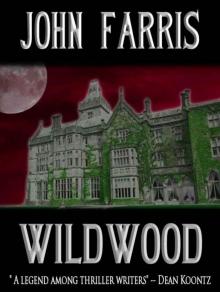 Wildwood
Wildwood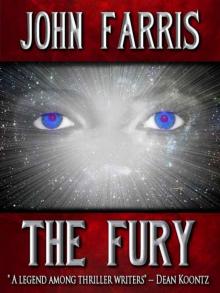 Fury
Fury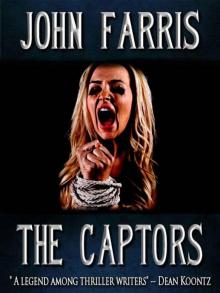 Captors
Captors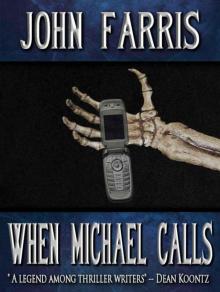 When Michael Calls
When Michael Calls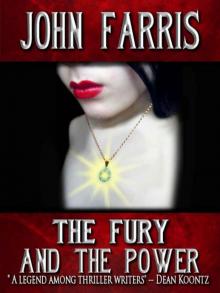 Fury and the Power
Fury and the Power Dragonfly
Dragonfly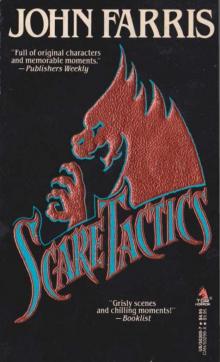 Scare Tactics
Scare Tactics